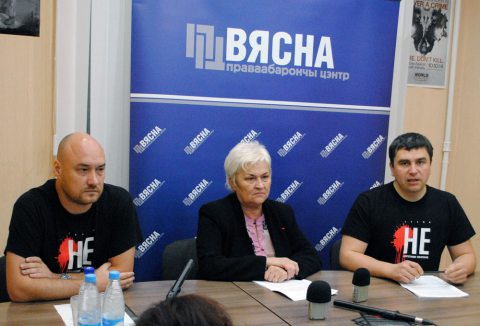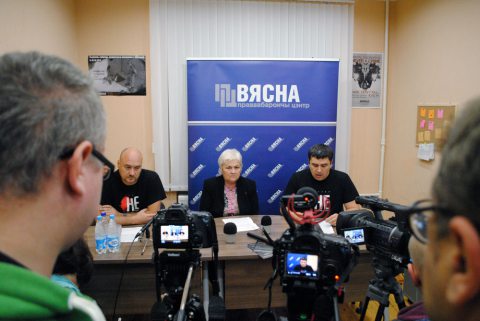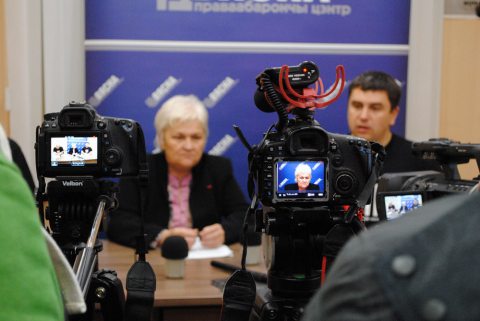Human rights defenders: a moratorium on the death penalty is needed first of all for the Belarusian society
-

- Press conference of "Human Rights Defenders against the Death Penalty" with the participation of Tamara Chikunova. October 10, 2014
On October 10, the World Day against the Death Penalty, Belarusian human rights activists gave a final press conference on the Week against the Death Penalty in Belarus.
Human rights activists, journalists and representatives of European Embassies (including Deputy Ambassador of the United Kingdom David Spires and Deputy Ambassador of Bulgaria Ivailo Ivanov) gathered at the office of Human Rights Centre “Viasna”.
At the beginning of the press conference "Belarus in the context of the global abolitionism" the campaign coordinator of the campaign "Human Rights Defenders against the Death Penalty in Belarus" Andrei Paluda presented the overall figures and tendencies on the death penalty in the world, referring to the last thematic report of the human rights organization Amnesty International.
According to the report, in 2013 executions were carried out in 22 countries, which is one more than the previous year. The total number of officially reported executions in the world is 778, 15% more than in 2012. But since 2009, due to lack of reliable information, Amnesty International has not published information on the death penalty in China, where it is a state secret, and thousands of executions are carried out.
Apart from China, nearly 80% of all known executions in the world have been reported in three countries: Iraq, Iran and Saudi Arabia. The five notorious leaders include the United States - the only country in North and South America where nine people were executed in 2013. At the same time, as noted in the report, the number of executions there continues to decline, and Maryland became the 18th state to abolish the death penalty.
Amnesty International states: in spite of these alarming developments, the overall evidence indicates that the trend towards abolition of the death penalty in the world continues.
"With regard to Belarus, our country is presented in this report as the last country in Europe and Central Asia, where the death penalty is still used. In 2013, according to available information, no death verdicts were executed in Belarus were not met, but at least four were issued. As you know, two of them were enforced in the spring of 2014 - against Pavel Sialiun and Ryhor Yuzepchuk. At least two people are now awaiting the execution of sentences – Eduard Lykau and Aliaksandr Hrunou. These sentences can be enforced at any time, because, despite the demands of international bodies, in particular the Human Rights Committee of the United Nations, Belarus does not postpone executions of the individuals whose cases are pending at the committee," said Andrei Paluda. 
In their work on the issue of the death penalty human rights defenders use mechanisms of the international organizations where Belarus is represented – the UN and the OSCE. Belarus is a party to a number of covenants and conventions, which allows the use of these mechanisms. Valiantsin Stefanovich, Deputy Chair of the HRC “Viasna”, told about the activities in this direction. One of the main steps is the use of the Universal Periodic Review, the second round of which will Belarus will pass at the Human Rights Council of the United Nations in April 2015.
"A coalition of 11 human rights organizations in Belarus has developed an alternative review, which was sent to the Human Rights Council of the UN in September. And one of the first issues of this alternative review is the right to life. Here we note that Belarus, which took on the obligation to abolish the death penalty, continues to use it. Since 2010, since the first passage of the UPR by Belarus, we have learned about the executions of nine persons. We are particularly concerned that in five cases the death penalty was enforced despite the fact that the individual appeals of these persons had been registered in the UN Human Rights Committee, and Procedure 92 of the Rules of Procedure of the UN HRC procedures was initiated for them, which means that the Belarusian Government was informed by the Committee about registration of these appeals and that the sentences could not be enforced prior to the consideration of these appeals on the merits. Belarus, in violation of its international obligations, carried out the execution of these death sentences. We also note the continued imposition of the death penalty by the Supreme Court of Belarus in the first instance, which implies that the verdicts are without appeal. Let me remind that this was the case with Kavaliou and Kanavalau, who were executed by shooting within two months after the sentencing by the Supreme Court. We also call on Belarus to change the procedure for execution of the death penalty, which has been repeatedly recognized by the UNCHR as inhuman treatment. We ask the countries represented in the Human Rights Council of the UN to recommend Belarus to ratify the Second Optional Protocol to the International Covenant on Civil and Political Rights, thus committing itself to a moratorium on the death penalty, as well as to change the criminal law in terms of procedures for execution of the death sentence and imposing a moratorium or abolition of the death penalty," stated the human rights activist.
Mr. Stefanovich also added that Belarus did not fulfill its obligations in terms of bringing the decisions taken by the UN Human Rights Committee to the citizens of the republic. “As you know, the HRC adopted two decisions about violation of the right to life by the Belarusian state – against Andrei Zhuk, who was shot in 2010, and Uladzislau Kavaliou, who was shot in 2012. The state should have these decisions to be published in the official media, within 180 days from the date of their adoption. Human rights defenders took this function to themselves within the campaign "Human Rights Defenders against the Death Penalty in Belarus," having published the HRC decision in the case of Uladzislau Kavaliou and informing the public about it.
Valiantsin Stefanovich also spoke about the position of the OSCE and the Council of Europe towards Belarus, in the events of which he had participated for the past two weeks.
He reminded that only two countries used the death penalty in the OSCE region, the United States and Belarus. And the OSCE has repeatedly adopted resolutions calling for these countries to impose a moratorium or abolish the death penalty. In the course of the latest Conference on the Human Dimension of the OSCE there was held a plenary session, where this recommendation was given to Belarus again.
The human rights activist stressed that the topic of the death penalty was being mentioned in the Council of Europe in line with the attempts of the Belarusian authorities to improve their image in the relations with the European Union and the USA:
"In the light of the latest events happening around Belarus, Lukashenka has become such a" dove of peace", and many people in the Council of Europe started talking about "windows of opportunities" for Belarus. To my mind, MP Samaseika's question about recovery of the special guest status in the Council of Europe was not incidental. The status was frozen after the referendum of 1996, and now is discussed at the Council of Europe again.
I met with the Secretary General of the Council of Europe Tornbjorn Jagland, who also said that the dialogue with Belarus was extremely important for them. I should remind that Belarus is the only European country that is not included in the Council of Europe. On the other hand, Mr. Jagland also stressed the importance keeping to the values in such a dialogue, and one of the basic values of the Council of Europe is the right to life. Therefore, the country can not become a member of the Council of Europe without a moratorium on the death penalty," commented the activist.
Valiantsin Stefanovich also said that Belarusian human rights activists support the accession of Belarus to the Council of Europe, which means ratification of the European Convention on Human Rights, recognizing the competence of the Strasbourg Court of Human Rights and declaring a moratorium on the death penalty. The human rights activist welcomed the fact that the European embassies in our country have created an informal working group on the abolition of the death penalty in Belarus (currently the group includes the Embassies of the United Kingdom, the Czech Republic, Poland, Bulgaria, France and Italy) with the aim to promote the issue of a moratorium on the death penalty.
"However, I would like to emphasize that we are asking for a moratorium on the death penalty not only because it is a question of Belarus' membership in the Council of Europe. First of all, the moratorium is needed for the Belarusian society, because we can not talk about the humanization of the society when the state allows itself to kill its citizens," summarized the human rights activist. 
The guest of honor of the Week against the Death Penalty, world-known abolitionist Tamara Chikunova, Chairperson of the Uzbek organization "Mothers against the Death Penalty and Torture", focused on the fact that responsibility for the killings in the country goes to the whole society.
"We need to understand that if those who have broken the law are punished with death on our silent agreement – we take revenge on them, justifying ourselves by law. How can we better than those who committed the crime? We say that there can't be an excuse for murder. So what excuse can we have if we support the law on the death penalty? I have very warm feelings for the kind-hearted Belarusian people and wish you to get rid of the death penalty – a crime against humanity. I myself went through the horror of the execution of my only son and I want to tell you: there is no justice in the death penalty. I am working to prevent grief from coming to people's homes in the form of the death penalty..." said Tamara Chikunova.
The human rights activist noted the importance of cooperation on the issue of the death penalty with international organizations. She confessed having received priceless support from a Christian organization, the Community of Sant'Egidio (centered in Rome), with which she has cooperated for many years by now.
Tamara Chikunova also told reporters about the work of her organization in favor of abolishing the death penalty in the countries of Central Asia and the peculiarities of the law abolishing the death penalty in Uzbekistan, in the drafting of which she was directly involved.



